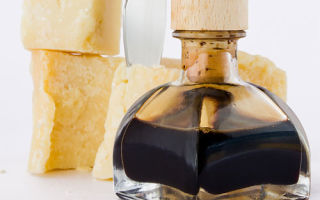Content
- 1 What is balsamic vinegar and what is it made from
- 2 Balsamic vinegar composition
- 3 The benefits of balsamic vinegar for the body
- 4 Why is balsamic vinegar useful for weight loss?
- 5 Can balsamic vinegar be used for pregnant women
- 6 Balsamic vinegar for breastfeeding
- 7 Balsamic vinegar in folk medicine
- 8 Balsamic vinegar in home cosmetology
- 9 How to make balsamic vinegar at home
- 10 How to use balsamic vinegar in cooking
- 11 The harm of balsamic vinegar
- 12 Contraindications to the use of balsamic vinegar
- 13 What is the difference between balsamic vinegar and wine
- 14 What can replace balsamic vinegar
- 15 How to choose the right balsamic vinegar
- 16 Conclusion
- 17 Reviews
Balsamic vinegar has become popular in recent years. Some believe that this was due to the appearance of this product in various salad dressings. But the most likely reason is its pronounced beneficial properties. To find out the reason for the popularity, you need to find out what are the benefits and harms of balsamic vinegar, and how it differs from other types.
What is balsamic vinegar and what is it made from
As early as 900 years ago, winemakers in the Modena region of Italy made balsamic vinegar, which they took as a tonic and healthy drink, and also served as a sign of favor to important people. It was then called wine vinegar, although this is not at all the case: it was made not from wine, but from pressed grapes, which had not yet begun to ferment.
The rich, slightly sweet aroma made it possible to add the product to salad dressings, gourmet marinades and sauces. Small amounts of the product can also add unusual flavor to soups and stews. It is the taste and complex aroma that make it much more pleasant and interesting than other types of vinegar.

The sweet white grape berries are placed under a press, boiled down to a dark syrup, and then kept under harsh conditions. The syrup is placed in oak barrels, after which the aging process begins. For a product to be called balsamic, 12 years must pass. With age, moisture evaporates, and due to the thickening of the workpiece, a piquant aroma is concentrated.
For many years, attempts have been made to store it in chestnut, cherry, ash, mulberry and juniper barrels in order to impart special properties to taste and smell. Some of the finest balsamic vinegars have been aged for over 100 years. It is this aging process that makes this product so expensive.
Balsamic vinegar composition
Real balsamic vinegar must be made from a specific grape variety. The rich brown color of the product appears from aging in wooden barrels, often for decades. It is made from grapes (and not from wine, like most vinegars), so its health benefits are obvious. However, there are many substandard variations that can be harmful to health.
The inexpensive balsamic vinegar found in shops today is often made by combining traditional white wine vinegar with colors and flavors. Such a product is not only not useful, but it can also cause harm if consumed continuously.
Its chemical composition is very complex and is not fully described in the sources. The main components include sugars (mainly glucose and fructose) and organic acids (acetic, gluconic, malic, tartaric, succinic).
The minor compound classes are volatile compounds and antioxidant molecules (mostly polyphenols).
Separately, melanoidins are isolated - a heterogeneous mixture of polymers arising from sugar decomposition reactions and activated during the cooking of grapes. These polymers provide many of the physical properties of the product, including refractive index, density, specific heat, and so on.

The benefits of balsamic vinegar for the body
The health benefits of balsamic vinegar have long been proven. The product is considered extremely useful in the following aspects:
- Improving skin health;
- Decrease in blood sugar levels. Balsamic vinegar has been found to have an antiglycemic effect when consumed, which means that a person's blood sugar will drop sharply after eating;
- Promote healthy digestion. Acetic acid is the active compound in this product. It contains strains of probiotics that aid digestion and support overall immune function;
- Reducing cholesterol levels. The benefits of balsamic vinegar can help lower cholesterol levels. Its antioxidants help block toxic cells in the body;
- Weight loss. The probiotics in balsamic vinegar can also help a person feel fuller longer. Some studies show that people can consume fewer calories during the day if they add this product to their morning meal;
- Wound treatment: the beneficial properties of balsamic vinegar in this direction have long been known;
- Reduction of arterial hypertension. This is especially noticeable if a person replaces fatty foods with vinegar, thus reducing the total amount of fat consumed;
- Reducing acid reflux and treating heartburn. This remedy may not work for everyone, so it's best to try it in small amounts and wait a few hours to see if it improves or worsens your symptoms.
- Promote blood circulation. Balsamic vinegar is obtained from grapes. Research has shown that grapes can protect against heart disease by preventing platelets from forming in blood vessels.
Why is balsamic vinegar useful for weight loss?
The properties of vinegars are known for their anti-obesity properties, and balsamic is no exception. As mentioned above, the product contains probiotic compounds that help a person feel full for longer. Unlike other dressings such as butter and mayonnaise, balsamic vinegar is fat-free. Of course, this is not a magic bullet for weight loss, but there is reason to believe that including it in the diet can help you lose weight.
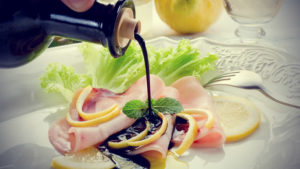
Can balsamic vinegar be used for pregnant women
Many are unsure if balsamic vinegar is good for pregnancy or if it might be harmful. Despite the fact that certain dangerous substances are still present in it, a very large amount will have to be consumed in order to harm the fetus.
There are some traces of lead in the product, but in small amounts that cannot be called dangerous. A person consumes more lead from tap water than from balsamic vinegar.
The intense aroma present in balsamic vinegar acts as a salt substitute, which affects sodium intake. The product is not completely free of this substance, but contains a low content of it.
As you know, edema often occurs in pregnant women, which can be reduced by limiting sodium intake. Balsamic vinegar is beneficial in that it is low in salt compared to other sauces.

Iron is also needed by women during pregnancy. It helps in making red blood cells. Balsamic vinegar contains 0.12 mg of iron. This is not much, but it still brings additional benefits for pregnant women.
Balsamic vinegar for breastfeeding
The benefits and harms of balsamic for breastfeeding are controversial. On the one hand, in a small amount, it cannot harm the body of the mother and child. On the other hand, it contains a small amount of lead, which can negate all the beneficial properties.
According to doctors, during the first 3 to 4 months of breastfeeding, it is worth stopping the use of any vinegars, and then gradually returning only high-quality expensive balsamic to your diet, the benefits of which are beyond doubt. When buying cheap options, there is a risk of purchasing a tinted, sweetened, low-quality product, the harm from which is much more than good.
Balsamic vinegar in folk medicine
Since the invention of the product, its beneficial properties have been used very actively. Hippocrates (about 420 BC) used it to heal wounds. Cleopatra (about 50 BC) dissolved precious pearls in it and made a love potion in this way.
Song Ze, the creator of 10th century forensic medicine, advocated washing hands with sulfur and vinegar to avoid contamination during autopsies.
According to the writings of practicing doctors at the end of the 18th century, many diseases - from dropsy to poisoning - were treated with balsamic vinegar, and the benefits of using it as a healing agent were considered proven. In addition, before the advent of hypoglycemic agents, it was famous for its obvious benefits in lowering blood sugar in diabetics.
Compress for wounds and burns
Balsamic vinegar has been used for many years to heal wounds. It is believed to have antifungal, antiviral, and antibacterial properties.
In order to prepare a compress for treating a burn or wound, balsamic is mixed with castor, linseed or olive oil in a 1: 2 ratio. This mixture is applied to gauze and then applied to the damaged skin. A layer of cotton wool is needed on top: bandage everything and leave for 4 - 6 hours. The beneficial properties of this folk remedy will become noticeable in a day.
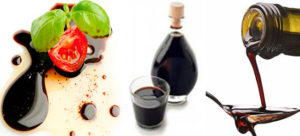
Gargling for colds
This product can help with sore throats. A rinse solution is prepared from it by mixing 5 ml of honey, 200 ml of warm boiled water and 15 ml of balsamic.
This mixture has significant benefits in relieving pain and inflammation.
Balsamic vinegar in home cosmetology
Balsamic has beneficial properties due to the presence of antioxidants, antimicrobial components and acetic acid in its composition.
These substances can help to improve the complexion, and over time, and quite deeply cleanse the skin.
Facial peeling
First of all, the benefits of balsamic are its cleansing properties. Therefore, peeling is often prepared from this product. To prepare it, you need a clean gauze or thin cloth. It should be folded in several layers, and then a little balsamic vinegar should be applied to it: it should be added to the fabric undiluted. The impregnated cloth is applied to the face for 15 minutes, avoiding contact with the eyes and lips.Then the compress is removed and they do not wash for an hour. After this time, you should wash your face with a sponge or soft washcloth to deeply cleanse the skin, and then wipe your face with ice.
Rinsing hair with balsamic vinegar
Many types of vinegar are traditionally used to rinse hair. This is explained by the fact that the acids in the composition of the product help to smooth the hair scales, so that the curls shine beautifully in the light. Especially useful for this purpose is balsamic, which has more useful substances in its composition.
To maximize the benefits of the hair product, dilute it with six parts water. And to prevent its evaporation, use immediately.
Moisturizing hand cream
Because balsamic helps soften the skin, it makes an excellent hand cream. This is done very simply. Balsamic vinegar in the amount of 15 ml should be added to a jar of any ready-made cream and mixed well, and then refrigerated for 12-18 hours.
How to make balsamic vinegar at home
Balsamic vinegar tastes unique and there is no complete substitute for it. It is almost impossible to repeat the process of its preparation at home. Of course, it's possible to find or mix several ingredients to get something similar in taste. However, the benefits and harms of such a product will differ significantly from the original. Although the original balsamic vinegar cannot be recreated, there are the following homemade recipes for its analogues:
- Mix 1 tablespoon of apple cider vinegar and half a teaspoon of sugar in a small cup. Stir until sugar dissolves. You can heat the mixture in a small saucepan to speed up the process. Allow the mixture to cool before using it in different recipes.
- Stir 1 tablespoon red wine vinegar with 1/2 teaspoon sugar in a small cup until sugar dissolves. Refrigerate completely before use.
- Combine five parts 6% table vinegar with one part sugar. Heat the mixture in a small saucepan to dissolve the latter. Cool to room temperature.
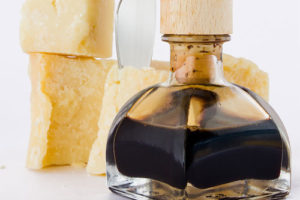
How to use balsamic vinegar in cooking
Balsamic is mainly used in salad dressings, marinades and sauces. It is used for cooking steaks, as well as fish or other grilled products.
In addition, it is used in many vegetable and meat dishes, pastas, risottos, fruit desserts, and for decoupage. Traditional balsamic vinegar is believed to aid digestion.
The harm of balsamic vinegar
The action of balsamic has 2 effects, with which its harm can be manifested.
Excessive consumption of the product can lead to erosion of the tooth enamel due to its high acidity, as well as due to the content of some lead in it.
Balsamic is slightly less acidic than other vinegars, but it can still destroy tooth enamel. The fact is that any type of food or drink with a pH of 4 and below has such undesirable properties. Balsamic has this figure of about 4. To reduce the effect of acid and minimize harm, it is better to mix the product with oils.
Doctors also recommend the following. It is advisable to rinse your mouth after a meal containing balsamic and wait about an hour, and only then brush your teeth.
On the other hand, the amount of lead in a product is considered too small to affect the adult body. But there is still a possibility that it can harm young children.
If an adult needs to consume 1 to 2 glasses of balsamic vinegar daily to get a dangerous dose of lead, then the child is clearly less affected. Studies have shown that even one tablespoon of balsamic can significantly increase the level of heavy metal in a child's body.
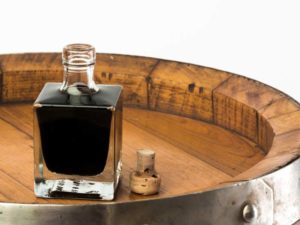
Contraindications to the use of balsamic vinegar
There are only a few possible side effects of consuming too much balsamic. The product is generally considered safe to eat if the person is not allergic. Potential risks include:
- stomach upset;
- sore throat;
- damage to the esophagus.
To avoid hurting themselves, the person should limit their intake of the product to about 2 tablespoons or less. You should not get carried away with balsamic for those who often have stomach upsets and other similar health problems.
Pay close attention to labels and labels before purchasing. Genuine balsamic can be expensive, but it does not contain added sugars, making its health benefits more visible.
What is the difference between balsamic vinegar and wine
Red wine vinegar and balsamic vinegar are prepared differently and will taste different when added. In order to decide which of them to use, you need to know the properties of each product.
Balsamic vinegar has a sweet fruity taste and mild acidity. It gives a rich flavor to salads and vegetable dishes. In practice, they can be seasoned with anything from grilled meats to boiled fruits. This is a great choice for decoupage.
But not all balsamic vinegars are created equal. There are several varieties. The best traditional balsamics are made from freshly harvested grapes. The juice is brewed to about 30% of the original volume, then fermented in wooden barrels for 12 years or more, becoming sweeter and more concentrated over time. The quality of a properly prepared balsamic is so amazing that you can drink it like a drink.
There is a cheaper version of this product, which is a mixture of balsamic and wine vinegar. You can also find quite budget versions in which the taste is recreated by adding sugar and other components.
As you might guess, red wine vinegar is made from red wine. Its name looks original, since the word "vinegar" itself comes from the French "vinagre", which means "sour wine".
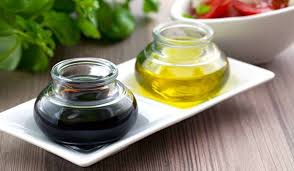
Red wine vinegar is aged for a shorter period of time - it only takes a year or two to ferment until tender. It is less sweet than balsamic and its harsher flavor is used to dress salads, sauces and marinades. The product goes well with strong aromas of spicy dishes. As is the case with the original balsamic, this product can be of different price and quality. Inexpensive varieties are aged for a shorter period of time, resulting in a sour and sharper product.
What can replace balsamic vinegar
As stated above, balsamic vinegar cannot be made at home. But it can be replaced with brown rice or Chinese black vinegar. The rice variant is especially popular in Asian countries, and is widely used in salad dressings as well as dipping sauces. Brown rice vinegar is made from brown rice, which gives it a dark amber color.
Like the brown rice product, Chinese black vinegar can be used to replace balsamic in many recipes. It is generally less expensive and can be used to make sauces, fries, soups, and marinades. It is usually made from rice, millet, wheat or sorghum and is characterized by its black color and malt flavor.
Besides Chinese black and brown rice, you can use sherry, fruit, or even red wine vinegar to replace balsamic in recipes. The latter will most likely have to be mixed with sugar or honey until a similar taste is achieved. This combination works well in marinades, sauces, and stews. On the other hand, sherry vinegar can be used to replace balsamic in sauces, stews, dressings and marinades.
How to choose the right balsamic vinegar
Balsamic of the highest quality is definitely marked as Aceto balsamico tradizionale. This label indicates that the product is prepared using traditional methods from Modena. For other markings, the requirements for processing and aging methods are not so strict, but the quality should still be good.
If the price of the product is very inexpensive, sulfites and a lot of sugar can be added as a preservative.
After purchasing, place the balsamic vinegar in a cool, dark place away from heat (such as a kitchen cabinet). Do not refrigerate it. It will not oxidize after opening, and it can be stored indefinitely. Sludge on the bottom of the bottle is a natural by-product of the aging process and is not harmful.
Conclusion
From the foregoing, the benefits and harms of balsamic vinegar appear depending on the quality of the product itself. However, the original can do many times more benefits than harm. It can be used in cooking and cosmetology, as well as for medical purposes. The main thing is not to save money when buying.

